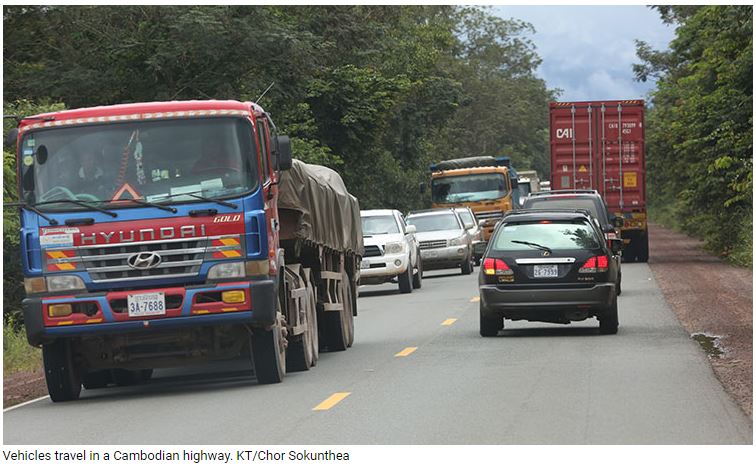Cambodia shielded by EBA as US-China trade war escalates, Moody’s says
Moody’s Investors Service Inc said Cambodia is among East Asian countries that could benefit from the relocation and investment by firms looking to reduce their exposure to US trade policy uncertainty in the face of a worsening US-China trade war in 2019.
In fact, it is less affected by the trade restrictions because its exports benefit from preferential tariff access under the Generalised System of Preferences (GSP) scheme, and the country is less integrated in global supply chains that are bearing the brunt from higher tariffs, such as electronics, said Matthew Circosta, Moody’s sovereign risk group analyst.
He said travel goods exports to the US such as luggage, backpacks, handbags, and wallets receive zero-tariff rate preferential treatment now.
“Under the GSP scheme, Cambodia’s garments and footwear exports benefit from additional preferences with the European Union through the ‘Everything-but-arms’ (EBA) agreement, although these trade privileges are at risk after the EU recently launched the process for the withdrawal of the EBA trade agreement,” he told Khmer Times via email.
He noted that manufacturers might aim to circumvent US tariffs by setting up operations in Cambodia, where businesses such as the production of bicycles has increased sharply while manufacturing clusters in Poipet and Bavet are driving production of watches and automotive components.
However, he warned that given foreign companies invest in Cambodia to take advantage of trade preferences, the potential withdrawal of the EBA could reduce the attractiveness of shifting their production base to Cambodia.
In a report titled ‘Global Macro Outlook: 2019-20: Global growth to decelerate amid tightening global liquidity and elevated trade tensions’ released today, Moody’s expects the trade dispute escalation to have negative spillover effects in several countries, particularly in Asia, where they are integrated in the global supply chain that passes through China.
“Having said that, over time, some countries may also partly benefit from relocation of production and investment by firms looking to reduce their exposure to US trade policy uncertainty. Vietnam, Philippines and Cambodia could potentially benefit from such a shift, followed by Taiwan, Singapore, Malaysia and Thailand,” it added.
This echoes World Bank senior economist Massimiliano Cali, who in the article ‘The impact of US-China trade war on East Asia’ published on Oct 16, said the replacement potential of Chinese exports in the US by East Asian countries – especially emerging economies – is quite significant.
For Vietnam, the largest opportunities lie in products such as chairs, insulated ignition, shrimp and prawns, travel bags, parts of seats, television cameras, wooden furniture and handbags.
“A much smaller set of products fulfills the characteristics for Cambodia including plywood sheets, handbags, travel and sports bags, lighting sets for Christmas trees, dog or cat food, parts of seats and bicycles, reflecting the high concentration of its export basket,” Mr Cali added in the article, which was published in the portal of US-based economic policy think-tank Centre for Policy Research.
Peck Boon Soon, RHB Research Institute chief Asean economist, told Khmer Times that the positive effect on Cambodia from the rising trade war tension is possible in the mid-to-long term based on the improvement of its infrastructure and relaxed policies.
“We believe the trade war escalation would benefit Vietnam first but if Cambodia becomes less expensive, has a ready infrastructure and relaxes its trading policies, it could eventually benefit but not immediately, maybe in the long-term,” he said via telephone.
Meanwhile, Moody’s reiterated that bilateral talks have not made headway because there are no clearly laid out objectives or expectations by the US administration around the talks.
The recent imposed tariffs by US on $200 billion worth of Chinese goods will likely rise to 25 percent from 10 percent in January 2019, which is on top of $50 billion worth of Chinese products that are already subject to US’ 25 percent tax.
Retaliatory counter-tariffs ranging from five percent to 10 percent on
$60 billion worth of US exports to China are also in place, Moody’s said, adding that early evidence suggests that all these measures are already starting to affect investment decisions, sentiment and economic growth globally.
It expects global economic growth to slow in 2019 and 2020 to a ‘little under 2.9 percent’ from 3.3 percent in 2018 and 2017, respectively, because of trade tensions and also tightening global liquidity.
As for G20 emerging markets, Moody’s said the real gross domestic product growth could slip to 4.6 percent in 2019, on weaker trade growth, tighter financial conditions and oil prices around current levels although it foresees a slight recovery to 4.9 percent in 2020.
“Growth in advanced economies will slow but remain solid in 2019, while
G20 emerging markets growth will remain weak,” said Madhavi Bokil, Moody’s vice president and lead author of the report, adding that in the US, waning fiscal stimulus, the ongoing removal of monetary accommodation and more restrictive trade measures will lower growth.
“The euro area will also see cyclical moderation to trend growth. Among
G20 emerging market countries, Turkey and Argentina will experience contractions, while China will experience a slowing economy,” she added.
Source: https://www.khmertimeskh.com/50548827/cambodia-shielded-by-eba-as-us-china-trade-war-escalates-moodys-says/


 Thailand
Thailand




